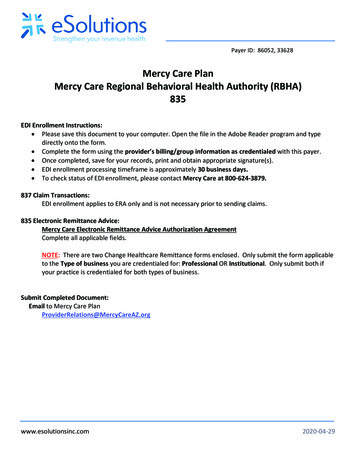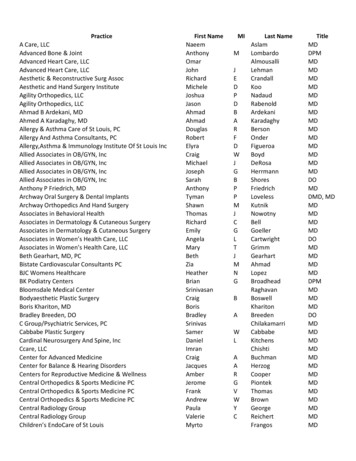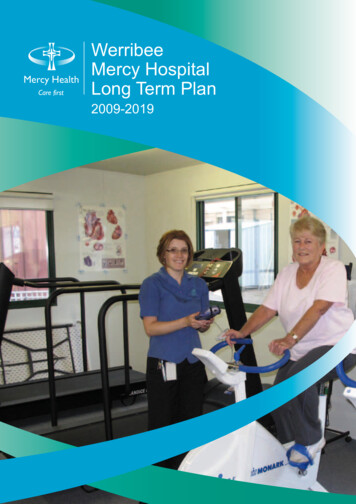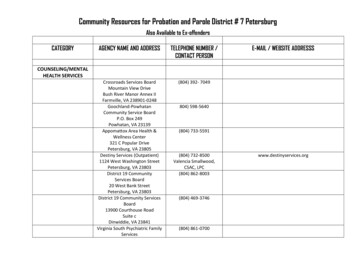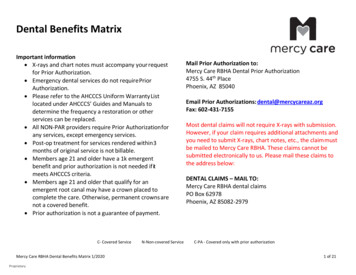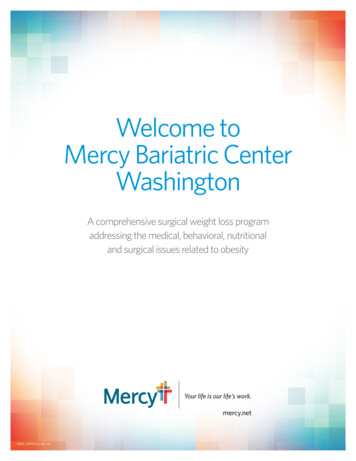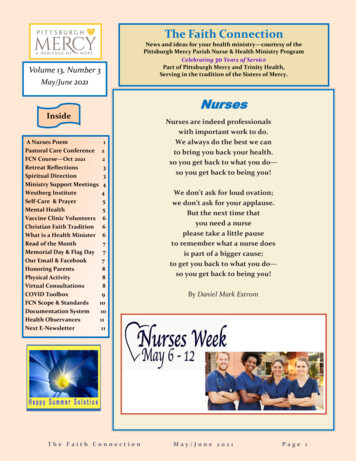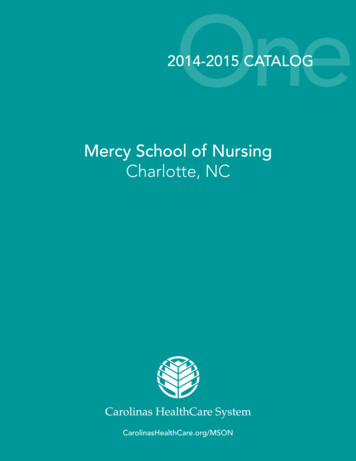
Transcription
Mercy CareRBHAVisit: www.MercyCareAZ.org
MERCY CARE RBHA PROVIDER MANUALPLAN SPECIFIC TERMSMercy Care Provider ManualChapter 400 – Mercy Care RBHA –Plan Specific TermsContent highlighted in yellow represents changes since the last Provider Manual iteration.RBHA Chapter 1 – Mercy Care RBHA Overview1.00 – About Mercy Care RBHA1.01 – Overview of the Arizona Public Behavioral Health System1.02 – Overview of Mercy RBHARBHA Chapter 2 – Network Provider Service Delivery Requirements2.00 Eligibility Screening for AHCCCS Health Insurance, Medicare Part DPrescription Drug Coverage and Low Subsidy Program2.01 – Additional Behavioral Health Appointment Availability Information2.02 – Referral and Intake Process2.03 – Outreach, Engagement, Reengagement and Closure2.04 – Emergency Services2.05 – Crisis Intervention Services2.06 – Behavioral Analysis Services2.07 – Assessment and Service Planning2.08 – Clinical Guidelines2.09 – Serious Mental Illness Decertification2.10 – General and Informed Consent2.11 – SMI Patient Navigator2.12 – Pre-Petition Screening, Court Ordered Evaluation, and Court OrderedTreatment2.13 – Housing for Individuals Determined to have Serious Mental Illness (SMI)2.14 Services with Special Circumstances - Non-Title XIX/XXI Behavioral HealthServices Benefit2.15 – Special Assistance for Members Determined to have a Serious MentalIllness (SMI)2.16 – Arizona State Hospital (AzSH)Mercy Care Provider Manual – Chapter 400 – Mercy RBHA – Plan Specific TermsLast Update: October 2020ProprietaryPage 1 of 312
MERCY CARE RBHA PROVIDER MANUALPLAN SPECIFIC TERMSRBHA Chapter 3 – Additional Mercy Care RBHA Provider Responsibilities3.00 – Provider Selection3.01 – Health Information Exchange3.02 – Psychiatric Visit Information3.03 – Case Management Contact Guidelines3.04 – Care Management Caseload Ratio Guidelines3.05 – Intra-RBHA Clinic Transfers3.06 – Provider Financial Reporting3.07 – Provider Deliverables3.08 – Business Continuity and Disaster Preparedness3.09 – Behavioral Health Satisfaction SurveyRBHA Chapter 4 – Covered and Non-Covered Services4.00 – Covered and Non-Covered ServicesRBHA Chapter 5 – Network Requirements5.00 – Provider Network Development and Management5.01 – Material Changes5.02 – Peer/Recovery Support Training, Certification and SupervisionRequirements5.03 – Parent/Family Support Provider Training, Credentialing and SupervisionRequirements5.04 – Out of State Treatment for Behavioral Health5.05 – Family and Youth Involvement in the Children’s Behavioral HealthSystem5.06 – Use of TelemedicineMercy Care Provider Manual – Chapter 400 – Mercy RBHA – Plan Specific TermsLast Update: October 2020ProprietaryPage 2 of 312
MERCY CARE RBHA PROVIDER MANUALPLAN SPECIFIC TERMSRBHA Chapter 6 – Pharmacy Management6.00 – Pharmacy Management Overview6.01 – Updating the Preferred Drug Lists (PDLs)6.02 – Notification of PDL Updates6.03 – Prior Authorization Required6.04 – Over the Counter (OTC) Medications6.05 – Generic vs. Brand6.06 – Diabetic Supplies6.07 – Injectable Drugs6.08 – Exclusions6.09 – Family Planning Medications and Supplies6.10 – Behavioral Health Medications6.11 – Request for Non-PDL Drugs6.12 – Discarded Physician-Administered Medications6.13 – Other Pharmacy ManagementRBHA Chapter 7 – Partnership Requirements with Families and Family RunOrganizations7.00 – Peer and Family Support Services7.01 – Incorporating Peer and Family Voice and Choice in Integrated CareRBHA Chapter 8 – Dental and Vision Services8.00 – Dental Services8.01 – Vision Services8.02 – Dental and Vision Community Resources for AdultsRBHA Chapter 9 – Care Coordination9.00 – Integrated Care Management9.01 – Chronic Condition ManagementMercy Care Provider Manual – Chapter 400 – Mercy RBHA – Plan Specific TermsLast Update: October 2020ProprietaryPage 3 of 312
MERCY CARE RBHA PROVIDER MANUALPLAN SPECIFIC TERMSRBHA Chapter 10 – Coordination of Care10.00 – Inter-T/RBHA Coordination of Care10.01 – Coordination of Care with AHCCCS Health Plans, PCPs and MedicareProviders10.02 – Coordination of Behavioral Health Care with Other GovernmentalEntities10.03 – Care Coordination for Management of Hospitalized Members Relatedto Integrated Health Program Service Requirements10.04 – Transition from Child to Adult ServicesRBHA Chapter 11 – Concurrent Review11.00 – Concurrent ReviewRBHA Chapter 12 – Quality Management12.00 Quality Management12.01 – Performance Improvement Projects12.02 – Peer Review12.03 – Behavioral Health Satisfaction SurveyRBHA Chapter 13 – Service Authorizations13.00 – Securing Services and Prior Authorization13.01 – Securing Services Does No Require Authorization13.02 – Accessing Services with Non-Contracted Providers13.03 – Accessing Services that Require Prior Authorization13.04 – How to Request a Prior Authorization13.05 – Third Party Liability (TPL)13.06 – Requirements for Certification of Need (CON) and Recertification ofNeed (RON)13.07 – Discharge Planning13.08 – Medical Necessity CriteriaMercy Care Provider Manual – Chapter 400 – Mercy RBHA – Plan Specific TermsLast Update: October 2020ProprietaryPage 4 of 312
MERCY CARE RBHA PROVIDER MANUALPLAN SPECIFIC TERMS13.09 – Coverage and Payment of Emergency Services13.10 – Newborn Notification Process13.11 – Technology13.12 – Pre-Admission Screening and Resident Review (PASRR)13.13 – Retrospective Review13.14 – Provider-Preventable Conditions13.15 – Inter-Rater ReliabilityRBHA Chapter 14 – Contract Compliance14.00 – Confidentiality14.01 – Verification of U.S. Citizenship or Lawful Presence for Public BehavioralHealth Benefits14.02 – Reporting Discovered Violations of Immigration StatusRBHA Chapter 15 – Demographic and Other Member Data15.00 – Enrollment, Disenrollment and Other Data SubmissionRBHA Chapter 16 – Reporting Requirements16.00 – Medical Institution Reporting of Medicare Part D16.01 – Reporting of Seclusion and RestraintRBHA Chapter 17 – Grievance System and Member Rights17.00 – Title XIX/XXI Notice and Appeal Requirements17.01 – Complaint Resolution17.02 – Conduct of Investigations Concerning Members with Serious MentalIllness17.03 – Notice and Appeal Requirements (SMI and Non-SMI/Non-Title XIX/XXI)17.04 – Provider Claim DisputesRBHA Chapter 18 – Scopes of Work18.0 – Scopes of WorkMercy Care Provider Manual – Chapter 400 – Mercy RBHA – Plan Specific TermsLast Update: October 2020ProprietaryPage 5 of 312
MERCY CARE RBHA PROVIDER MANUALPLAN SPECIFIC TERMSRBHA Chapter 1 – Mercy Care RBHA Overview1.00 – About Mercy Care RBHAMercy Care RBHA (herein Mercy RBHA), as part of MC, is a not-for-profit partnership sponsoredby Dignity Health and Ascension Care Management. Mercy RBHA is committed to promotingand facilitating quality health care services with special concern for the values upheld inCatholic social teaching, and preference for the poor and persons with special needs. AetnaMedicaid Administrators, LLC administers Mercy RBHA for Dignity Health and Ascension CareManagement.Mercy RBHA is a managed care organization that provides health care services to people inArizona's Medicaid program that integrates member’s behavioral health and physical healthneeds. Mercy RBHA provides services to the Arizona Medicaid populations that include: Serious Mental Illness: Persons who, as a result of a “mental disorder” (as defined inA.R.S. §36-501), exhibit emotional or behavioral functioning that is so impaired as tointerfere substantially with their capacity to remain in the community withoutsupportive treatment or services of a long-term or indefinite duration. In these persons,mental disability is severe and persistent, resulting in a long-term limitation of theirfunctional capacities for primary activities of daily living such as interpersonalrelationships, homemaking, self-care, employment and recreation, as defined in A.R.S.§36-550 diagnosed in persons 18 years and older. Comprehensive Medical and Dental Program (CMDP): CMDP is a health planestablished to provide medical and dental care, inpatient, outpatient, and other servicesfor individuals in foster care through agreements between the Arizona Department ofEconomic Security (ADES), the Arizona Health Care Cost Containment System (AHCCCS the State’s Medicaid Authority) and ADHS. Crisis: Behavioral health members receiving emergency/crisis services through ourCrisis Response Network. Grants: Behavioral health members may be covered under grants such as:o Substance Abuse Block Grant (SABG) is a Formula Grant, which supportstreatment services for Title XIX/XXI and Non-Title XIX/XXI members withsubstance use disorders (SUD) and primary substance use and misuse preventionefforts. The SABG is used to plan, implement, and evaluate activities to preventand treat substance abuse disorders. Grant funds are also used to provide EarlyIntervention Services for HIV and tuberculosis disease in high-risk individualswho use substances. SABG funds are only to be used for allowable servicesidentified in AMPM Exhibit 300-2B for priority populations within AMPM 320-T.Mercy Care Provider Manual – Chapter 400 – Mercy RBHA – Plan Specific TermsLast Update: October 2020ProprietaryPage 6 of 312
MERCY CARE RBHA PROVIDER MANUALPLAN SPECIFIC TERMSo Governor's Office - Substance Use Disorder Services (GO-SUDS) are dollarsallocated to Mercy Care by the state of Arizona. These funds are allocated tosubstance abuse treatment providers specifically for uninsured or under-insuredindividuals with an Opioid Use Disorder (OUD). These dollars are the payer of lastresort.o Mental Health Block Grant (MHBG) is allocated from SAMHSA to provide mentalhealth services to Title XIX/XXI and Non-Title XIX/XXI adults with an SMIdesignation, Title XIX/XXI, and Non-Title XIX/XXI children with an SEDdesignation, and Title XIX/XXI and Non-Title XIX/XXI individuals in need of FEPservices. MHBG funds are only to be used for allowable services identified inAMPM Exhibit 300-2B.o State Targeted Response Grant (STR) & State Opioid Response Grant (SOR) arefederal dollars intended for Increasing infrastructure and access to Opioid UseDisorder (OUD) treatment. Select providers are subcontracted to coordinatecare, offer recovery support services and prevention activities to reduce theprevalence of OUDs and opioid-related overdose deaths.The State of Arizona has chosen Mercy RBHA, a locally owned and operated non-profit healthplan, as the Regional Behavioral Health Authority (RBHA) for Maricopa County.Under contract with Mercy RBHA, providers are expected to follow the contents of thisprovider manual, Mercy RBHA Policies and Procedures as well as fulfill the scope of the contractterms. Mercy RBHA maintains a Network Management department for providers to askquestions and request technical assistance as well as to discuss contractual and programchanges.For more information about Mercy RBHA, its departments and their functions, please visitwww.MercyCareAZ.org.Mercy Care RBHA is dedicated to providing its members access to care for their behavioral andmedical health (integrated care) needs. Our focus is on the whole-member and uses a holisticapproach to care. We want to know our members’ goals, use their strengths and understandtheir needs. We know how to provide access to high-quality, integrated care to people whohave complex needs and work with the community and local health care providers to assurethose needs are met.The Arizona Health Care Cost Containment System (herein AHCCCS) has developedexpectations for Mercy RBHA’s Provider Manual, which includes content specific to ourgeographic service areas (GSA) and communities. The Mercy RBHA Provider Manual describesMercy Care Provider Manual – Chapter 400 – Mercy RBHA – Plan Specific TermsLast Update: October 2020ProprietaryPage 7 of 312
MERCY CARE RBHA PROVIDER MANUALPLAN SPECIFIC TERMSpublic behavioral and integrated care health system requirements for any entity that directlyprovides behavioral health/integrated care services. These entities may include: Behavioral health/integrated care contracted and non-contracted providers, includingthose that provide emergency and post-stabilization services; Behavioral health/integrated care prevention services providers; and Mercy RBHA itself.The Mercy RBHA Provider Manual is applicable to defined populations that may access publicbehavioral health/integrated care services. These populations include: Behavioral health members receiving emergency/crisis services; Non-Title XIX members determined to have a Serious Mental Illness; Members receiving services through the Substance Abuse Block Grant (SABG); MentalHealth Block Grant (MHBG); or Governor' Office Substance Use Disorder funds. Non-enrolled members participating in AHCCCS prevention sponsored activities; Non-enrolled members participating in AHCCCS HIV Early Intervention services; Other populations based on the availability of funding and the prioritization of availablefunding.Providers are contractually obligated to adhere to and comply with all terms of the plan andprovider contract, including all requirements described in this manual in addition to all federaland state regulations governing the plan and the provider. Mercy RBHA may or may notspecifically communicate such terms in forms other than the contract and this provider manual.While this manual contains basic information about Mercy RBHA as well as AHCCCSrequirements, providers are required to fully understand and apply these requirements whenadministering covered services.Please refer to the AHCCCS website at https://www.azahcccs.gov/ for further informationregarding AHCCCS regulations.1.01 – Overview of the Arizona Public Behavioral Health SystemAHCCCS is the single state Medicaid Agency to administer behavioral health benefits formembers who are Title XIX and Title XXI eligible.Mercy RBHA, in turn, subcontracts with community providers that administer behavioral healthprograms and services for children and adults and their families. Mercy RBHA is responsible forthe oversight of the administration of behavioral health services for several populations fundedthrough various sources.Arizona state law requires Mercy RBHA to administer community-based treatment services foradults who have been determined to have a Serious Mental Illness.Mercy Care Provider Manual – Chapter 400 – Mercy RBHA – Plan Specific TermsLast Update: October 2020ProprietaryPage 8 of 312
MERCY CARE RBHA PROVIDER MANUALPLAN SPECIFIC TERMSThe Substance Abuse and Mental Health Services Administration (SAMHSA) provides funding toAHCCCS through two block grants: The Substance Abuse Block Grant (SABG) supports a variety of substance abuse servicesin both specialized addiction treatment and more generalized behavioral healthsettings, and for priority populations outlined within the AHCCCS Medical PolicyManual, Policy 320-T – Non-Title XIX/XXI Behavioral Health Service Benefit. The Mental Health Bock Grant is allocated from SAMHSA to provide mental healthservices to Title XIX/XXI and Non-Title XIX/XXI adults with an SMI designation, TitleXIX/XXI and Non-Title XIX/XXI for children with an SEC designation, and Title XIX/XXI andNon-Title XIX/XXI individuals in need of First Episode Psychosis (FEP) services.Mercy RBHA administers other federal, state and locally funded behavioral health services.Individuals can get more information about AHCCCS programs by visiting their website athttps://www.azahcccs.gov/.1.02 – Overview of Mercy RBHAMercy RBHA System PrinciplesAll healthcare services must be delivered in accordance with AHCCCS system principles.AHCCCS supports a healthcare system that includes: Easy access to care; Behavioral health member and family involvement; Collaboration with the Greater Community; Effective innovation; Expectation for improvement; and Cultural competency.Easy Access to Care Accurate information is readily available that informs healthcare members, families andstakeholders how to access services; The healthcare network is organized in a manner that allows for easy access tobehavioral health/integrated care services; and Services are delivered in a manner, location and timeframe that meet the needs ofhealthcare members and their families.Behavioral health member and family involvement Behavioral health members and families are active participants in behavioral healthdelivery system design, prioritization of behavioral health resources and planning forand evaluating the services provided to them; and Behavioral health members, families and other parties involved in the member andMercy Care Provider Manual – Chapter 400 – Mercy RBHA – Plan Specific TermsLast Update: October 2020ProprietaryPage 9 of 312
MERCY CARE RBHA PROVIDER MANUALPLAN SPECIFIC TERMSfamily’s lives are central and active participants in the assessment, service planning anddelivery of behavioral health services and connection to natural supports.Collaboration with the Greater Community Stakeholders including general medical, child welfare, criminal justice, education,Veterans Affairs Administration and other social service providers are actively engagedin the planning and delivery of integrated services to behavioral health members andtheir families; Relationships are fostered with stakeholders to maximize access by healthcare membersand their families to needed resources such as housing, employment, medical anddental care, and other community services; and Providers of healthcare services collaborate with community stakeholders to assisthealthcare members and families in achieving their goals.Effective Innovation Healthcare providers are continuously educated in the application of evidence-basedpractices; The services system recognizes that substance abuse, mental health, and physical healthdisorders are inextricably intertwined, and integrated substance abuse and mentalhealth evaluation and treatment is the community standard; and Interested healthcare members and families are provided training and supervision to beretained as providers of peer support services.Expectation for Improvement Services are delivered with the explicit goal of assisting people to achieve or maintainsuccess, recovery, gainful employment, success in age-appropriate education, return toor preservation of adults, children and families in their own homes, avoidance ofdelinquency and criminality, self-sufficiency and meaningful community participation; Services are continuously evaluated, and modified if they are ineffective in helping tomeet these goals; and Healthcare providers instill hope that achievement of goals is possible even for the mostdisabled.Integration of Primary Health and Behavioral HealthcareMercy RBHA utilizes an integrated care approach to positively affect the health and quality oflife of our high-risk members diagnosed with a SMI, based on member-defined strengths, needsand preferences. We weave physical, behavioral and psychosocial support needs together toimprove member outcomes, enhance quality of life, and reduce racial and ethnic healthdisparities associated with SMI, as well as disparities based on racial and ethnic backgrounds.Mercy Care Provider Manual – Chapter 400 – Mercy RBHA – Plan Specific TermsLast Update: October 2020ProprietaryPage 10 of 312
MERCY CARE RBHA PROVIDER MANUALPLAN SPECIFIC TERMSMercy RBHA has adopted two models of integration for members with serious mental illness.These models are intended to provide a comprehensive array of physical and mental healthcare services, as well as health prevention and promotion services.Model 1: Integrated Health Home (IHH)An integrated health home is a place where members receive whole-member oriented care fortheir needs including primary care, behavioral health care, general counseling services, carecoordination, specialty health service referral, medication management, health promotion,prevention, wellness services, member and family health education services (e.g., chronicdisease management, healthy lifestyle, etc.), evidence-based programs (e.g., supportedemployment, peer support services, etc.), care management and outreach services.Providers of integrated care must operate as a team that functions as the single-point of wholehealth treatment and care for all of a member's health care needs. Co-location or makingreferrals without coordinating care through a team approach does not equate to integratedcare. Integrated teams include (at a minimum) a PCP, BHP, registered nurse, care manager,medical assistant, team member to lead care coordinating, team member to lead wellnessactivities, housing coordinator, vocational coordinator and peer.Integrated health home includes wellness programming for earlier identification andintervention that reduces the incidence and severity of serious physical and mental illness usingtools such as the HRA, disease registries, etc. IHH goals include improved member's experienceof care and individual health outcomes.Model 2: Virtual Health HomeA virtual health home is designed for those members who choose to stay with their primarycare practice or behavioral health clinic which are not integrated. This model provides healthcoaches at selected primary care practices, who work as part of team within the PCP practiceand closely coordinate care with a Behavioral Health Representative at a partnered behavioralhealth clinic. These health coaches take a whole-member oriented approach and work with themember, the primary care physician and the behavioral health provider to coordinate care,medications and promote wellness.Integrated Health Home RequirementsThe following are additional requirements for Integrated Health Home (IHH) providers.1.Integrated Care Training – All IHHs must have (at a minimum) one MasterTrainer in the Connecting Minds curriculum. All staff (administrative staff,clinical, care managers, allied health, supervisors, etc.) working with an IHH mustcomplete all four modules of the Connecting Minds: Inter-professionalMercy Care Provider Manual – Chapter 400 – Mercy RBHA – Plan Specific TermsLast Update: October 2020ProprietaryPage 11 of 312
MERCY CARE RBHA PROVIDER MANUALPLAN SPECIFIC TERMS2.3.4.Collaboration for Whole Health (Connecting Minds) training within eight (8)months of hire within an IHH.Interdisciplinary Team Meetings (IDT) – Providers, within an IHH, must attendweekly IDT meetings and use the skills and format from the Connecting Mindstraining.Daily Huddles – Providers, within IHHs, are required to huddle daily using thedaily huddle skills provided in the Connecting Minds training.Integrated Individual Service Plan (IISP) – Providers within an IHH are requiredto complete an IISP for all members using a format with all the requiredelements as outlined in the Connecting Minds training.Additionally, the Data Collection Instrument (DCI) is required for all T19 members enrolled in anIntegrated Health Home (IHH) or Virtual Health Home (VHH). The DCI is to be completed within30 days of a member’s enrollment in an IHH or VHH, and annually thereafter. For those enrolledin the VHH model, the physical health partner would complete the DCI. For the IHH, please beadvised that the DCI only needs to be completed for T19 members enrolled in the integratedmodel on site (opting into see physical and behavioral health at the clinic). IHH/VHH’s targetedthresholds for the DCI is identified as 85% per IHH/VHH (not per agency).Use of TermsAn attempt was made to use consistent terminology throughout the Provider Manual to thebest extent possible. Members receiving healthcare services are referred to as “behavioralhealth members” or simply as “members”.Revisions to Provider ManualPolicies established as medical policies are updated annually or more frequently, if changesare necessary. Other sections of the Provider Manual are updated on an ongoing basis, butat a minimum, sections will be reviewed every year. For information or changes that mustbe communicated immediately, AHCCCS issues Policy Clarification Memorandums undertheir Guides and Manuals for Health Plans and Providers web page for both behavioralhealth and physical health providers. Mercy RBHA incorporates any changes made byAHCCCS into their provider manual as soon as it’s received.Healthcare providers and others may provide comments and request for revisions to theProvider Manual. Healthcare providers and other interested members should contact theMercy RBHA Network Management at 800-564-5465 to provide input and requests forupdates. Providers should note that policy revisions will be available both on Mercy RBHA’swebsite at www.MercyCareAZ.org, and via email to all contracted providers.Mercy Care Provider Manual – Chapter 400 – Mercy RBHA – Plan Specific TermsLast Update: October 2020ProprietaryPage 12 of 312
MERCY CARE RBHA PROVIDER MANUALPLAN SPECIFIC TERMS Provider Notices: Notices to providers regarding changes in program policy orprocedures will also be distributed via e-mail to contracted providers and posted towww.MercyCareAZ.org.Mercy Care Provider Manual – Chapter 400 – Mercy RBHA – Plan Specific TermsLast Update: October 2020ProprietaryPage 13 of 312
MERCY CARE RBHA PROVIDER MANUALPLAN SPECIFIC TERMSRBHA Chapter 2 – Network Provider Service Delivery Requirements2.00 – Eligibility Screening for AHCCCS Health Insurance, Medicare Part D Prescription DrugCoverage and Low Subsidy ProgramTitle XIX/XXI Screening and Eligibility ProcessThere are three steps involved in screening for Title XIX/XXI eligibility: First, verify the member’s Title XIX or Title XXI eligibility. Next, for those members who are not Title XIX or Title XXI eligible; screen for potentialTitle XIX or other eligibility. Finally, as indicated by the screening tool, assist members with applications for a TitleXIX or other eligibility determination.Step #1-Accessing Title XIX/XXI or Other Eligibility InformationContracted providers who need to verify the eligibility and enrollment of an AHCCCS membercan use one of the alternative verification processes 24 hours a day, 7 days a week. Theseprocesses include: AHCCCS web-based verification (Customer Support 602-417-4451): This websiteallows the providers to verify eligibility and enrollment. To use the website, providersmust create an account before using the applications. To create an account, go to:https://azweb.statemedicaid.us/Account and follow the prompts. Once the providershave an account they can view eligibility and claim information (claim information islimited to FFS). Batch transactions are also available. There is no charge to providers tocreate an account or view transactions. For technical web-based issues, contact AHCCCSCustomer Support at 602-417-4451, Monday – Friday 7:00 a.m. to 5:00 p.m. AHCCCS contracted Medical Electronic Verification Service (MEVS): The AHCCCSmember card can be “swiped” by providers to automatically access the AHCCCS’ PrepaidMedical Management System (PMMIS) for up to date eligibility and enrollment. Forinformation on MEVS, contact the MEVS vendor - Emdeon at 800-444-4336. Interactive Voice Response (IVR) system IVR: Allows unlimited verification informationby entering the AHCCCS member’s identification number on a touch-tone telephone.This allows providers access to AHCCCS’ PMMIS system for up to date eligibility andenrollment. Maricopa County providers may also request a faxed copy of eligibility fortheir records. There is no charge for this service. Providers may call IVR within MaricopaCounty at 602-417-7200 and all other counties at 800-331-5090. Medifax: Medifax allows providers to use a PC or terminal to access the AHCCCS’PMMIS system for up to date eligibility and enrollment information. For information onEVS, contact Emdeon at 800-444-4336. If a member’s Title XIX or Title XXI eligibility status still cannot be determined using oneof the above methods, the provider must:o Call Mercy RBHA Member Services at 800-564-5465 for assistance during normalMercy Care Provider Manual – Chapter 400 – Mercy RBHA – Plan Specific TermsLast Update: October 2020ProprietaryPage 14 of 312
MERCY CARE RBHA PROVIDER MANUALPLAN SPECIFIC TERMSbusiness hours (8:00 am through 5:00 pm, Monday-Friday); oro Call the AHCCCS Verification Unit. Callers from outside Maricopa County can call800-331-5090 or call 602-417-7200 in Maricopa County. When calling the AHCCCSVerification Unit, the provider must be prepared to provide the verification unitoperator the following information:o Provider’s identification number;o The member’s name, date of birth, AHCCCS identification number and socialsecurity number (if known); ando Dates of service(s)Step #2-Interpreting Eligibility InformationA provider will access important pieces of information when using the eligibility verificationmethods described in Step #1 above. The AHCCCS Reference Subsystem Codes and Valuesinclude a key code index that may be used by providers to interpret AHCCCS eligibility keycodes and/or AHCCCS rate codes. Mercy RBHA must ensure that providers have access to andare familiar with the codes as they may help indicate provider responsibility for the delivery ofTitle XIX/XXI covered services. If Title XIX or Title XXI eligibility status and behavioral health provider responsibility isconfirmed, the behavioral health provider must provide any needed covered behavioralhealth services in accordance with the AHCCCS Medical Policy Manual, Policy 310-B – TitleXIX/XXI Behavioral Health Service Benefit. There are some circumstances whereby a member may be Title XIX eligible but theAHCCCS behavioral health system is not responsible for providing covered behavioralhealth services. This includes members enrolled as elderly or physically disabled (EPD)under the Arizona Long Term Care System (ALTCS) Program and members eligible forfamily planning services only through the Sixth Omnibus Reconciliation Act (SOBRA)Extension Program. A member who is Title XIX eligible through ALTCS must be referredto his/her ALTCS ca
10.01 - Coordination of Care with AHCCCS Health Plans, PCPs and Medicare Providers 10.02 - Coordination of Behavioral Health Care with Other Governmental Entities 10.03 - Care Coordination for Management of Hospitalized Members Related to Integrated Health Program Service Requirements 10.04 - Transition from Child to Adult Services

